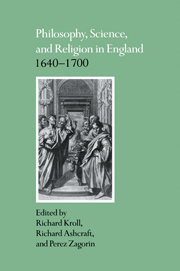1 - Introduction
Published online by Cambridge University Press: 05 November 2011
Summary
One of the most dangerous ideas for a philosopher is, oddly enough, that we think with our heads or in our heads.
The idea of thinking as a process in the head, in a completely enclosed space, gives him something occult.
Ludwig Wittgenstein, Zettel, nos. 605–6The problem
In 1662, one S.P. (commonly held to be Simon Patrick) issued from Cambridge a twenty-four page epistolary tract addressed to an Oxonian friend (“G.B.”). A Brief Account of the New Sect of Latitude-men, Together with Some Reflections upon the New Philosophy has by now achieved the status of a classic in English intellectual and cultural history, and has spawned many volumes many times its size. The tract has drawn, and continues to draw such inordinate attention partly because it claims to report on cultural phenomena at a historical juncture between the Interregnum and the Restoration for which historians of most kinds still possess no satisfactory model. A Brief Account has also drawn attention because of its peculiarly negative status as evidence, which has often made it a site of many different forms of methodological and ideological projection, and accordingly a litmus-test of the current state of scholarship. Rather than describing a concrete group of individuals in entirely positive language, it describes in the broadest, even the vaguest terms, a series of generic attitudes within a group S.P. wishes to defend.
- Type
- Chapter
- Information
- Publisher: Cambridge University PressPrint publication year: 1992
- 5
- Cited by



